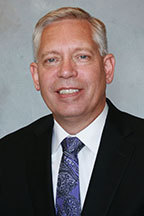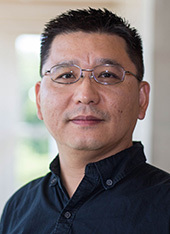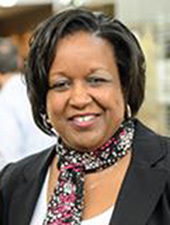The little things make faculty mentoring program stand out
Author: Jeff Budlong
This is an archived story. The content, links and information may have changed since the publication date.
Author: Jeff Budlong
Whether it is a moment or a lifetime, mentoring is not just something between instructor and student. It is just as important between faculty members.
Mentoring can take on many forms at Iowa State, but the formal mentoring program pairs new tenure-eligible faculty with senior colleagues, typically from the same department. Its duration varies, but focus is put on the tenure process leading up to the third-year review.
"It is critical to our mission of creating, sharing and applying knowledge," assistant provost for faculty development Tera Jordan said. "We frequently think of that in the context of students, but it relates to our core mission and faculty development. It helps ensure our campus is open and accessible to all."
January is National Mentoring Month, but Jordan said mentoring is something the university is constantly evaluating. Opening other pathways for term and tenured faculty is being discussed by university leaders to bring mentoring full circle.
"We are working to bring more consistency across the campus community related to availability of mentors as well as identifying a mentor," Jordan said. "We have focused on mentors in your department or definitely in your college, but I would like to expand that lens if we can to connect with other people not always in your discipline that could benefit from a mentoring relationship."
Mentoring has an important role in the College of Veterinary Medicine for Derald Holtkamp, professor in veterinary diagnostic and production animal medicine.

Holtkamp
"We often don't have the typical model of faculty members who get a Ph.D., immediately take a job in academia and spend their career there," he said. "Most of them have some experience in the private sector, and as a consequence, how we are evaluated for promotion or tenure relies more on the impact we can have on the industry rather than our number of publications."
A less formal structure means the need for strong mentor-mentee relationships that build institutional knowledge.
Holtkamp, a 2020 Exemplary Faculty Mentor Award winner, had his own positive experience as a mentee when he joined the university in 2006. It was then he learned how little efforts can make the biggest difference.
"The most useful things came out of the informal interactions," he said. "It may be a specific problem or question I was trying to figure out, and I would reach out to them and those were the most fruitful."
Finding common research interests can build a foundation and fill in gaps with issues that may otherwise go overlooked such as filling out forms or grant proposals.
"It can be very helpful to hear from a mentor what needs to be done to be promoted and achieve tenure," he said. "There is always a lot of room for interpretation ... so it is nice to have a faculty member provide advice and guidance."
Holtkamp sees mentoring as a chance to build community in a department, college or the university while simultaneously strengthening the faculty.
Associate professor in supply chain management Haozhe Chen views mentoring as not only key to an individual's success, but a group’s. It is something the Ivy College of Business takes seriously, assigning a mentor to each faculty member who joins the college.

Chen
"It is a very important element in developing a supportive culture," Chen said. "I would say it is something we definitely have in our department. It is often the daily interactions with colleagues that are most helpful."
Chen -- who received the faculty mentor award in 2019 -- credits his department's openness and willingness to help one another for making it a place where faculty can succeed. It also keeps the goals of a department or college aligned, he said.
Chen came to ISU from another university and benefited most from help that went beyond procedures of trying to attain tenure or how best to put together and deliver a course.
"It was the things that were not so tangible," he said. "It was the small things that helped me settle into a new environment, and learn how to get up and running as quickly as possible."
Chen stresses those tips and small pieces of advice with his mentees, favoring an informal approach.
Chen believes he can get as much out of interactions with new faculty as they can.
"Every person comes from a different background and has a different experience, so by working with them I am exposed to new ideas and practices," he said.
Newer faculty have plenty on their plate, and School of Education professor Connie Hargrave feels she can best assist them by keeping things in perspective.

Hargrave
"Having somebody who could see the big picture even though I was caught up in the details or specifics has always been very helpful," said the 2020 faculty mentor award recipient. "Someone with more experience can see what you are trying to do and how it needs to be situated in a larger context."
Having a mentor early on helps answer the not so obvious questions nearly everyone has when beginning a job, but also it shows the commitment the university makes to its faculty, Hargrave said. Finding a mentor outside of one's discipline can help faculty realize there is a larger world on campus than just their department and how their work fits in, she said.
"When a university makes that kind of investment and continues to grow that investment, it says how important faculty are and how important faculty success is to the university," Hargrave said.
Keeping interactions and suggestions frank and practical is something Hargrave does with her mentees.
"I try to help people remember their own humanity and the humanity of their students," she said.
Hargrave has many unofficial mentors that have turned into friends over the years who find different ways to support and motivate each other as the relationship evolves. The need for a mentor may change, but their impact is often felt long after the work is done, she said.